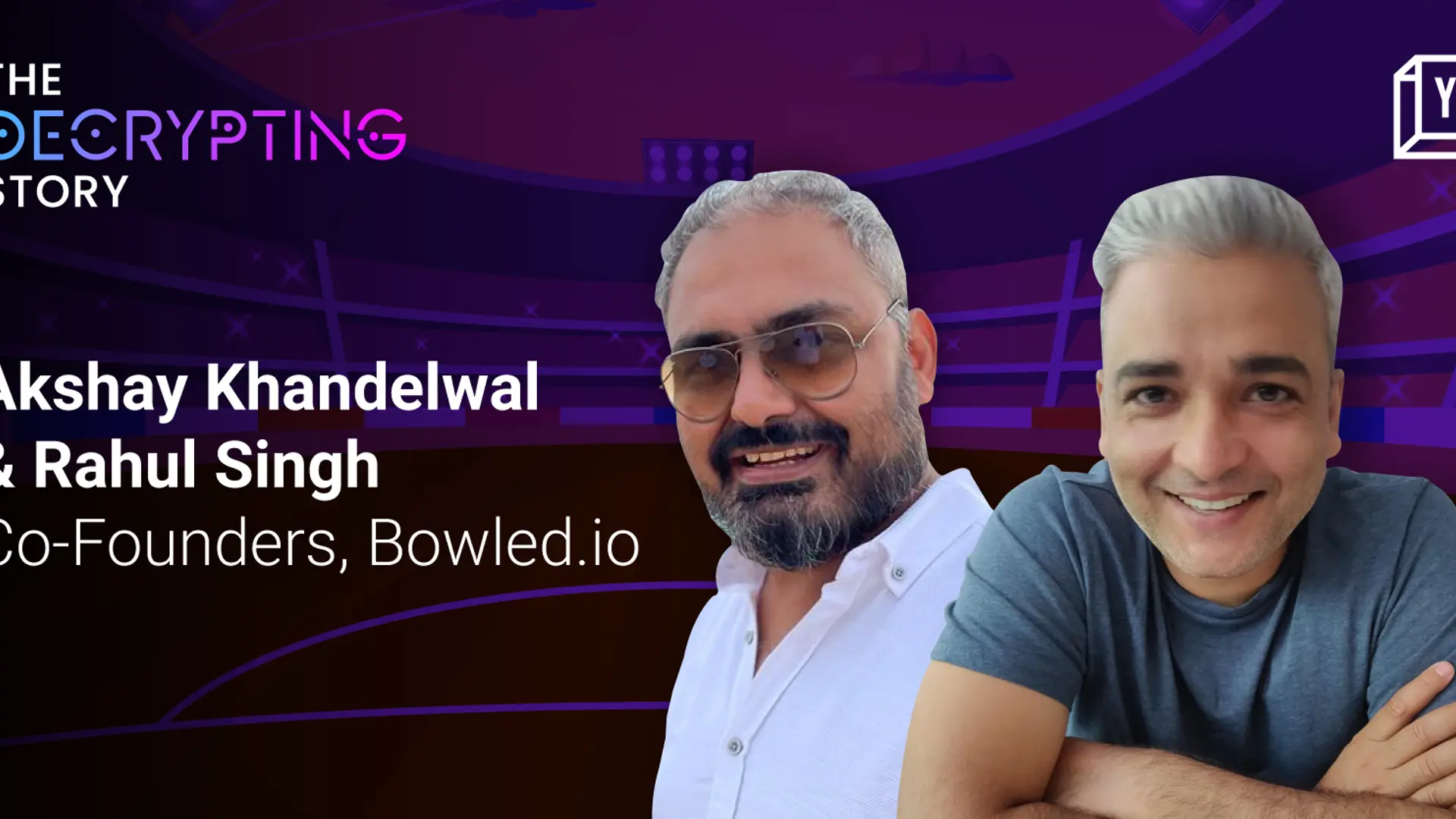With Harsha Bhogle as advisor, Bowled.io enables users to earn by playing cricket games
Rahul Singh and Akshay Khandelwal are building Bowled.io—a platform where users can connect, play hyper-casual cricket games, own digital collectibles, and win rewards. The startup was featured on Shark Tank India.
When Rahul Singh and Akshay Khandelwal decided to build a social gaming platform, focusing on the game of cricket was an obvious choice. However, it was not because cricket is immensely popular in India.
Singh and Khandelwal—through their experience working on sports entertainment products—did not find a single platform where cricket fans could engage with each other, play games, trade collectibles, and more.
This led to the genesis of —a sports-based social gaming platform targeting cricket fans. Established in March 2022, the startup wants to build an entertaining and engaging fan experience through games, community-building, and Web3 technology.
“Besides watching live games, cricket fans only followed match scores, followed their favourite players online, and used fantasy gaming platforms. There was no two-way platform to engage with each other and other stakeholders in the game,” Singh tells The Decrypting Story.
Singh is an IIM Lucknow and IIT Madras alum, while Khandelwal holds degrees from INSEAD and IIT Madras.
To make the fan experience more engaging, Bowled.io has built a platform where users can play hyper-casual games, connect, own digital collectibles, and win rewards.
The platform leverages blockchain technology to facilitate the creation, usage, and transfer of in-game digital assets interoperably between games on its platform. It also allows users to retain permanent ownership of the assets they own.
In January 2023, the startup onboarded cricket commentator and media personality Harsha Bhogle as an advisor and investor.
So far, it has raised a pre-seed funding round, and the size of the funding and other investors are undisclosed. Moreover, Bowled.io was featured in an episode of Shark Tank India.
How Bowled.io works
The platform has six hyper-cause cricket games, two card games, and one social gaming feature, and it claims to see traction from well over 100 countries.
It also claims to have over 200,000 downloads and 25,000-30,000 monthly active users (with around 1,000 daily users).
On its platform, users can compete in player-versus-player battles, view leaderboards across formats, and participate in a marketplace for NFT-based cosmetics, player skins, and stadium skins.
“The reason we focus on games and not trading collectibles is we believe the average Indian user does not have the persona of a collector. Wine or stamp collectors in India are few and far between,” Singh adds.
This is a markedly different approach from the other two major Indian projects at the intersection of cricket and Web3. Rario and FanCraze—which focus on licensed digital collectibles (NFTs) of cricket players—have built their models around the trading of these NFTs
Bowled.io, however, wants to build a comprehensive experience around cricket, and in the future, around more sports.
Despite their differences, Bowled.io and other cricket NFT platforms in India have something in common—they are building economies around the in-game assets owned and traded by users.
In fact, this is true for most startups utilising blockchain tech to create a gaming platform. The rise of the ‘play-to-earn’ (P2E) movement, pioneered by Axie Infinity, saw startups globally build secondary marketplaces for owners of in-game assets to trade on.

With Tegro, WazirX founder is making it easy to buy and sell blockchain game assets
Focus on utility
Although Axie revolutionised P2E, it suffered from unsustainable economic models, highlighted by dwindling demand for its NFTs and excess supply of its crypto tokens.
Its rise and fall demonstrated the need for building more utility in the traded collectibles and a sustainable approach to creating an in-game economy.
“We didn’t want to build a platform where users are only interested in the trading and speculation aspect of the in-game assets. We wanted our platform to have engaging, free-to-play, interoperable games, which create a high degree of utility for the in-game assets,” Singh says.
Moreover, there is no barrier to entry since the cricket games on Bowled.io are free to play. A user can simply download the app and begin playing.
“Many NFT games have a barrier to entry, where users have to buy or rent an NFT to play the game. On Bowled.io, there is no obligation to make any purchases,” he adds.
Ronin—a blockchain built by Sky Mavis, which also built Axie Infinity—powers the NFT experience on Bowled.io. It is crafted for such developers to build games with player-owned economies.
Further, the startup’s in-game assets do not involve photo-realistic depictions of real-life cricketers. Its assets are generic player cards and points-based tokens. As such, Bowled.io does not have to pursue acquiring the IP rights for depicting assets bearing the likeness of real-life cricketers.
“These assets, held on Ronin wallets and maintained on the Ronin chain, can be used inside the games on our platform. They are also tradeable,” Singh says.
“Users can come to our platform for free, play some games, and earn some tokens in the form of in-game currency. They can also use these tokens to play other sort of games on our platform, such as card games.”
The startup is also working on a crypto-based governance token, which can be acquired in exchange for selling in-game assets or cards earned on the platform. “Users can convert these tokens into other crypto tokens or stablecoins,” Singh adds.
Going forward, the 20-member startup plans to increase the pace of its product development and build its marketplace model, crypto token, and explore adding more games on the platform.
Edited by Suman Singh







